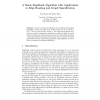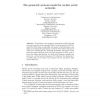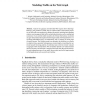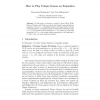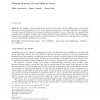169
click to vote
WAW
2010
Springer
15 years 1 days ago
2010
Springer
We give an improved algorithm for computing personalized PageRank vectors with tight error bounds which can be as small as (n-p ) for any fixed positive integer p. The improved Pag...
226
Voted
WAW
2010
Springer
15 years 1 days ago
2010
Springer
We introduce a new geometric, rank-based model for the link structure of on-line social networks (OSNs). In the geo-protean (GEO-P) model for OSNs nodes are identified with points ...
117
Voted
WAW
2010
Springer
15 years 1 days ago
2010
Springer
157
click to vote
WAW
2010
Springer
15 years 1 days ago
2010
Springer
Abstract. Analysis of aggregate and individual Web requests shows that PageRank is a poor predictor of traffic. We use empirical data to characterize properties of Web traffic not ...
136
click to vote
WAW
2010
Springer
15 years 1 days ago
2010
Springer
Abstract. Motivated by social network data mining problems such as link prediction and collaborative filtering, significant research effort has been devoted to computing topologica...
151
Voted
WAW
2010
Springer
15 years 1 days ago
2010
Springer
We study the effect of information overload on user engagement in an asymmetric social network like Twitter. We introduce simple game-theoretic models that capture rate competition...
199
click to vote
WAOA
2010
Springer
15 years 1 days ago
2010
Springer
In this paper, we improve a result by Arora, Khot, Kolla, Steurer, Tulsiani, and Vishnoi on solving the Unique Games problem on expanders. Given a (1-)-satisfiable instance of Uniq...
203
click to vote
WAOA
2010
Springer
15 years 1 days ago
2010
Springer
We consider the problem to minimize the weighted sum of completion times in nonpreemptive parallel machine scheduling. In a landmark paper from 1986, Kawaguchi and Kyan [5] showed ...
133
Voted
WAOA
2010
Springer
15 years 1 days ago
2010
Springer
We consider cut games where players want to cut themselves off from different parts of a network. These games arise when players want to secure themselves from areas of potential i...
135
Voted
WAOA
2010
Springer
15 years 1 days ago
2010
Springer
The r-domination search game on graphs is a game-theoretical approach to several graph and hypergraph parameters including treewidth and hypertree width. The task is to identify t...
